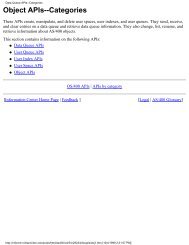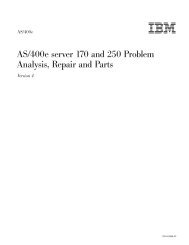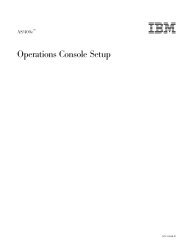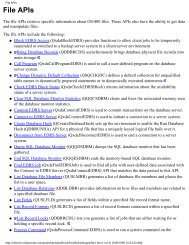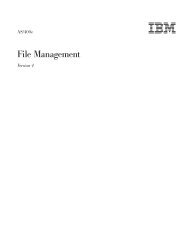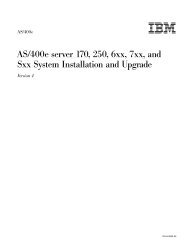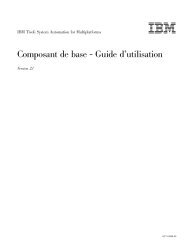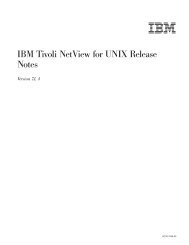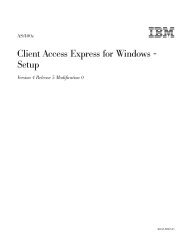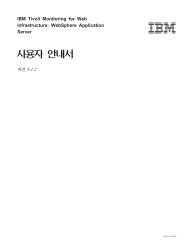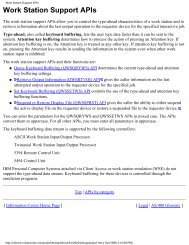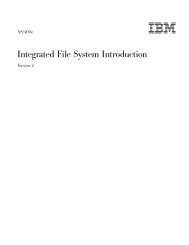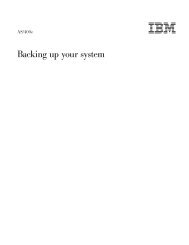Qshell Interpreter (qsh) - FTP Directory Listing - IBM
Qshell Interpreter (qsh) - FTP Directory Listing - IBM
Qshell Interpreter (qsh) - FTP Directory Listing - IBM
Create successful ePaper yourself
Turn your PDF publications into a flip-book with our unique Google optimized e-Paper software.
LC_MONETARY (Locale monetary formatting)<br />
This variable defines the monetary names, symbols, and other details.<br />
There is no default value.<br />
LC_NUMERIC (Locale numeric formatting)<br />
This variable defines the decimal point character for formatted input/output<br />
and string conversion functions. There is no default value.<br />
LC_TIME (Locale time formatting)<br />
This variable defines the date and time conventions, such as calendar<br />
used, time zone, and days of the week. There is no default value.<br />
LC_TOD (Locale time zone)<br />
This variable defines the time zone name, time zone difference, and<br />
Daylight Savings Time start and end. There is no default value.<br />
NLSPATH (Search path for message catalogs)<br />
When opening a message catalog, the system searches the directories<br />
listed in the order specified until it finds the catalog. The value of the<br />
variable is a colon separated list of directories. There is no default value.<br />
PATH (Search path for commands)<br />
If the command you specify does not begin with a slash (/), <strong>qsh</strong> searches<br />
the directories listed in the order specified until it finds the command to run.<br />
The value of the variable is a colon separated list of directories. The current<br />
working directory is specified by a period (.) or a null directory before the<br />
first colon, between two colons, or after the last colon. The default value is<br />
“/usr/bin:”.<br />
PS1 (Primary prompt string)<br />
When the interactive option is set, <strong>qsh</strong> performs parameter expansion,<br />
command substitution, and arithmetic expansion on the variable and<br />
displays it on stderr when <strong>qsh</strong> is ready to read a command. The default<br />
value is “$ ”.<br />
PS2 (Secondary prompt string)<br />
When you enter before completing a command <strong>qsh</strong> displays the<br />
value of this variable on stderr. The default value is “> ”.<br />
PS4 (Debug prompt string)<br />
When the execution trace option is set and the interactive option is set, <strong>qsh</strong><br />
performs parameter expansion, command substitution, and arithmetic<br />
expansion on the variable and displays it on stderr before each line in the<br />
execution trace. The default value is “+ ”.<br />
Q<strong>IBM</strong>_CHILD_JOB_SNDINQMSG (Send inquiry message when child process<br />
starts)<br />
When this variable is set to a positive numeric value, the parent process is<br />
sent an inquiry message with the qualified job name of the child process.<br />
The child process is held until you reply the message. By setting this<br />
variable, you can debug the program running in the child process by setting<br />
breakpoints before the program runs. The value of the variable is the level<br />
of descendant processes to debug. When set to 1, child processes are<br />
held, when set to 2 child and grandchild processes are held, etc. There is<br />
no default value.<br />
Q<strong>IBM</strong>_MULTI_THREADED (Start multi-thread capable processes)<br />
This variable determines if processes started by <strong>qsh</strong> can create multiple<br />
threads. When the value of the variable is Y, all child processes started by<br />
<strong>qsh</strong> can start threads. The default value is N.<br />
Chapter 3. Command Language 15



